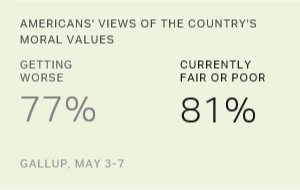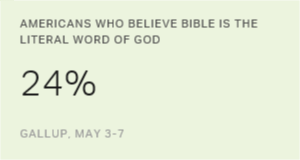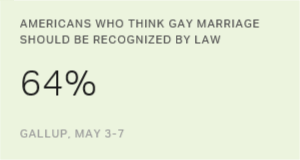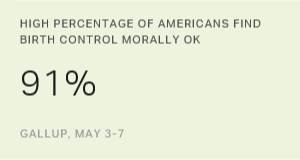Story Highlights
- 81% say state of moral values is "only fair" or "poor"
- 77% say the state of moral values is getting worse
- Views have been consistently negative, at least since 2002
WASHINGTON, D.C -- Americans' ratings of U.S. moral values, consistently negative through the years, have slipped to their lowest point in seven years. More than four in five (81%) now rate the state of moral values in the U.S. as only fair or poor.
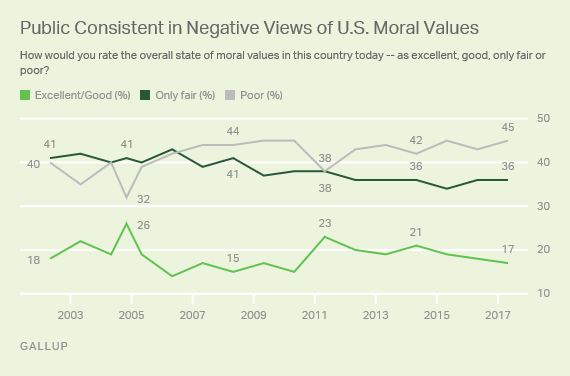
Since Gallup first asked in 2002 whether the nation's moral values were getting better or getting worse, the percentage saying worse has always been well above the majority level, ranging from a low of 64% in November 2004 to a high of 82% in May 2007. Over the past six years, it has stayed within a five-point range, reaching a low of 72% in 2013 and 2015 before climbing to this year's high of 77%.
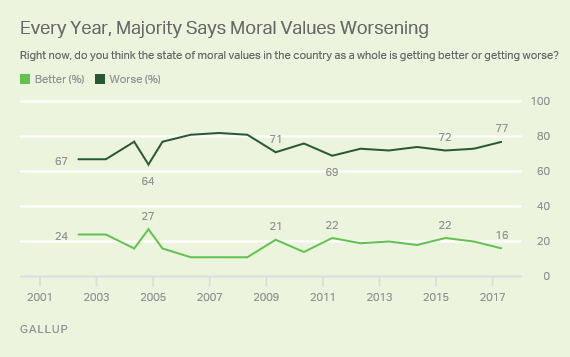
Gallup's question about the current state of moral values getting better or worse has been asked over the same 16-year span as the question about the overall state of moral values. The combined percentage saying moral values are only fair or poor through the years has generally aligned with views about moral values getting worse.
The percentage of those having a positive view of the country's moral values -- either excellent or good -- peaked at 26% in November 2004, the same time that a high of 27% of people said the state of moral values was getting better. The individual highs that year were 4% excellent and 22% good.
Americans' low regard for their nation's moral values was evident in questions extending back well before the current questions were first asked 16 years ago. In 1991, 63% of U.S. adults said they were dissatisfied with the ethics and moral standards of the American people. In a 1996 poll, 39% said the state of moral values in the country today was somewhat weak, and 39% said it was very weak.
Social Moderates Most Negative, but Liberals' Ratings Also Low
Americans who define their views on social issues as liberal have seen their ranks grow from 21% in 1999 to 30% this year, reflecting the movement of the public toward acceptance of liberal positions on several moral values-related issues. Americans now support liberal views in record numbers on 10 different social issues.
With public opinion on those issues moving in a liberal direction, and with major Supreme Court rulings in recent years supporting abortion rights and gay marriage, social conservatives have always been more likely than liberals to say the state of moral values is poor and more likely to say it is getting worse. But even among liberals, in no year have more than a third described moral values as excellent or good, and only in 2009 -- a few months after Barack Obama's first presidential inauguration -- did less than a majority say it was getting worse.
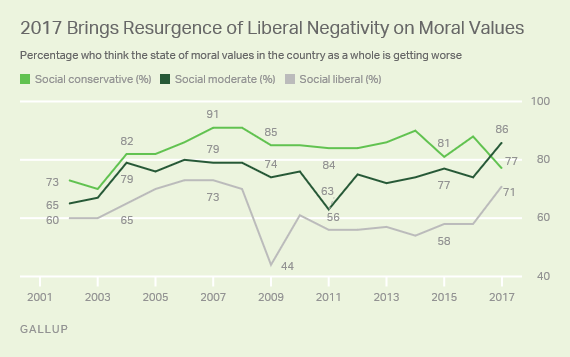
The percentage of social liberals who thought moral values were getting worse stayed below 60% for most of Obama's presidency but rose to 71% this year with Republican Donald Trump's inauguration. The change from a Democratic White House to a Republican one also contributed to a substantial drop in pessimism among social conservatives. Seventy-seven percent -- an 11-percentage-point drop from last year -- now say moral values are getting worse.
With the percentage of moderates saying moral values are getting worse now up to 86%, 2017 is the first year social conservatives are not the group most likely to think values are worsening.
Attitudes Differ Widely by Age, Locale
No majority of any major demographic group views the state of moral values as good or excellent, but opinions differ significantly when looking at those who rate the state of the nation's values as poor. The overall average for the 16 years that Gallup has been asking the question is 42% saying poor, but that rises above 50% among a few groups and drops to a third or less among others:
- Major differences occur by age. About half (51%) of those aged 65 and older believe moral values are in a poor state; 33% of those aged 34 and younger agree.
- Fifty-four percent of those who live in a rural area, compared with 33% of those living a big city, say moral values are poor.
- Thirty-one percent of those with postgraduate work say the country's moral values are poor.
Bottom Line
Though majorities of Americans say they are proud of their country and are satisfied with their overall quality of life, they are not as positive about the state of the nation's moral values. Even liberals, who seemingly should be pleased with the growing number of Americans who agree with their point of view on the morality of prominent social issues, are more likely to say things are getting worse than getting better.
Two possible reasons for the negativity among liberals in general and the rise in negativity this year among both moderates and liberals:
- While social conservatives look at the decline in marriages, the increase in children born outside of marriage and the growing number of Americans identifying as nonreligious, social liberals have no lack of moral issues that concern them, including the position of blacks and racial minorities in the nation and the nation's efforts to deal with poverty and homelessness. Further, Trump's emergence has brought forth a barrage of articles from liberal publications about the coarsening of moral values.
- Americans are not necessarily thinking about moral values in terms of abortion, gay marriage or other social issues that produce legislation and Supreme Court rulings. Polls in 2010 and 2012 that asked respondents to cite the most important problem with moral values found that the reason most often cited was lack of respect or tolerance for others, with poor parenting also frequently mentioned.
With both conservatives and liberals criticizing the other side for lack of respect and with Americans of all backgrounds able to find some moral issue to deplore, there seems to be little chance of a substantive change in the near future to the longstanding trend of Americans having overwhelmingly negative views about the state of moral values.
Historical data are available in Gallup Analytics.
Survey Methods
Results for this Gallup poll are based on telephone interviews conducted May 3-7, 2017, with a random sample of 1,011 adults, aged 18 and older, living in all 50 U.S. states and the District of Columbia. For results based on the total sample of national adults, the margin of sampling error is ±4 percentage points at the 95% confidence level. All reported margins of sampling error include computed design effects for weighting.
Each sample of national adults includes a minimum quota of 70% cellphone respondents and 30% landline respondents, with additional minimum quotas by time zone within region. Landline and cellular telephone numbers are selected using random-digit-dial methods.
View survey methodology, complete question responses and trends.
Learn more about how the Gallup Poll Social Series works.
